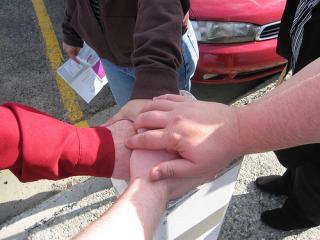What's the big deal with Clusters?
By Beth Casebolt

Lately you’ve been hearing a lot about clusters, especially in relationship with regionalization. I’ve had folks ask, “So is clusters just a cheaper way to provide services?” Well, in some ways, yes, clearly it is less time consuming for staff to provide the same workshop once to a cluster than to two or three different churches in that same cluster. But it’s more than staff time. It’s also about the effect of having different people with different experiences at different churches does to change the dynamic of the workshop. It suddenly becomes more participatory and interactive, less lecture style — which is a good thing!
Clusters provide opportunities for congregations who do not have the volunteers, or the critical mass of a particular age range to be able to make a program or a social justice project available to their congregants. Think about it — one small congregation rarely has the necessary volunteers and number of junior high students to make a Our Whole Lives class go. But two or three small congregations geographically close to each other band together and suddenly they have plenty of students and volunteers. Often a congregation would like help with a food pantry but don’t have the volunteers to staff it for a month. Several congregations together would, have those volunteers.
Clusters do other sorts of things too. Ministers might do pulpit exchanges, giving members an opportunity to hear another leader. Several clusters in our districts have worked together to offer Healthy Congregations/Smart Church Training to their leadership. The OMD Southern Cluster held a revival a couple of years ago. The Pittsburgh Cluster is planning an Assembly day in November, offering workshops on a variety of topics to their members. Each of these activities would not be nearly as easy to accomplish by one congregation.
When we come together for a common purpose — an RE class, a social justice project, sharing of resources — we get stronger. Our congregants benefit. We don’t burn out our volunteers as quickly. It’s win-win for everyone. That’s why your staff think clusters are so important.
What programs could your cluster collaborate on?
Beth Casebolt
OMD District Administrator and CERG Communications Consultant